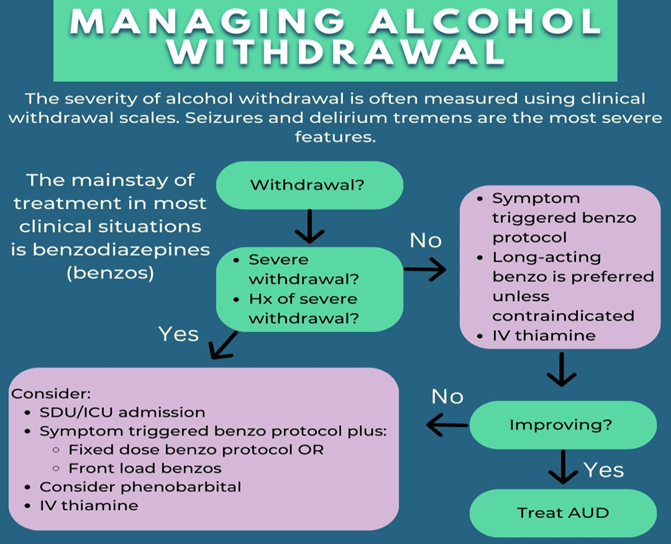A nurse is caring for a client who begins showing signs of alcohol withdrawal delirium. Which of the following medications should the nurse administer?
Methadone
Acamprosate
Disulfiram
Lorazepam
The Correct Answer is D
A. Methadone is an opioid agonist primarily used for the management of opioid dependence and chronic pain. It is not indicated for the treatment of alcohol withdrawal or delirium.
B. Acamprosate is a medication used to support abstinence in individuals who have recently stopped drinking alcohol. It is not typically used to manage acute alcohol withdrawal symptoms such as delirium tremens.
C. Disulfiram is a medication used as an aversive therapy to deter alcohol consumption by causing unpleasant reactions (e.g., flushing, nausea, vomiting) when alcohol is ingested. It is not indicated for the treatment of alcohol withdrawal or delirium.
D. Lorazepam is a benzodiazepine commonly used to manage alcohol withdrawal symptoms, including delirium tremens. It acts by enhancing the inhibitory effects of gamma- aminobutyric acid (GABA) in the central nervous system, thereby reducing the symptoms of alcohol withdrawal such as seizures.

Nursing Test Bank
Naxlex Comprehensive Predictor Exams
Related Questions
Correct Answer is B
Explanation
A. Lithium carbonate is typically taken with food to minimize gastrointestinal side effects.
Taking it on an empty stomach may increase the risk of nausea and other GI symptoms.
B. It can take up to 3 weeks to see the full effects of lithium carbonate, which is used to treat bipolar disorder.
C. Clients do not need to follow a low-sodium diet; in fact, maintaining a consistent sodium intake is important while taking lithium,
D. While adequate fluid intake is important to prevent dehydration, there's no specific recommendation to limit fluid intake to 800 ounces per day. However, clients should be advised to maintain hydration and be cautious of excessive fluid intake, especially if they have kidney or cardiovascular issues.
Correct Answer is A
Explanation
A. Benztropine, an anticholinergic medication, can cause urinary retention or difficulty with urination as a side effect due to its anticholinergic properties. Clients should be instructed to report any difficulty voiding promptly, as it can lead to complications such as urinary tract infections or bladder distention.
B. Benztropine is not typically associated with diarrhea as an adverse effect.
C. While anticholinergic medications can cause tachycardia (increased heart rate) due to their anticholinergic effects, they are not associated with slow pulse.
D. Benztropine is used to decrease excessive salivation (sialorrhea) rather than causing it as an adverse effect.
Whether you are a student looking to ace your exams or a practicing nurse seeking to enhance your expertise , our nursing education contents will empower you with the confidence and competence to make a difference in the lives of patients and become a respected leader in the healthcare field.
Visit Naxlex, invest in your future and unlock endless possibilities with our unparalleled nursing education contents today
Report Wrong Answer on the Current Question
Do you disagree with the answer? If yes, what is your expected answer? Explain.
Kindly be descriptive with the issue you are facing.
